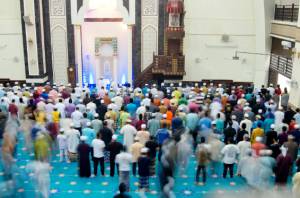الصيام والصلاة
الصيام والصلاة هما من أهم العبادات في الإسلام، فالصيام هو الامتناع عن الطعام والشراب والجماع والتنفس الخارجي من طلوع الفجر إلى غروب الشمس، بينما الصلاة هي الاتصال المباشر بالله عز وجل، وهي العمود الفقري للعبادة في الإسلام.
فالصيام والصلاة يتمثلان في الاستمرارية والاهتمام بالعلاقة بين الإنسان وخالقه، وهما من أهم الوسائل التي يستطيع بها المسلم أن يرتبط بالله عز وجل، وأن يقرب منه.
في هذا المقال، سوف نتحدث عن أهمية الصيام والصلاة، وكيف يتم تطبيقهما في الإسلام، وما هي الفوائد التي يمكن أن يحصل عليها المسلم من الصيام والصلاة.
أهمية الصيام والصلاة في الإسلام:
الصيام والصلاة هما من العبادات الأساسية في الإسلام، وهما يعتبران من الطرق المباشرة للتواصل مع الله عز وجل، وتحقيق الاستقامة في الحياة.
وقد أمر الله سبحانه وتعالى المسلمين بالصيام والصلاة في القرآن الكريم، فقال تعالى: “يا أيها الذين آمنوا كتب عليكم الصيام كما كتب على الذين من قبلكم لعلكم تتقون” (سورة البقرة: 183).
وكما أمر الله تعالى المسلمين بالصلاة، فقال تعالى: “حافظوا على الصلوات والصلاة الوسطى وقوموا لله قانتين” (سورة البقرة: 238).
فعندما يصوم المسلم، فإنه يمتنع عن الأكل والشرب والجماع والتدخين وغيرها من الأشياء التي تفطر الصوم، ويقضي وقته في الذكر والصلا
ة وقراءة القرآن والتفكر في خلق الله، وهذا يساعده على تحقيق الاستقامة في حياته، وتحسين علاقته بالله عز وجل، وتطهير نفسه من الذنوب والخطايا.
أما الصلاة، فهي الاتصال المباشر بالله عز وجل، وهي العمود الفقري للعبادة في الإسلام. فعندما يصلي المسلم، فإنه يتوجه بقلبه وجسمه إلى الله عز وجل، ويذكره ويحمده ويطلب منه الغفران والرحمة والعافية، وهذا يساعده على تحقيق الاستقامة في حياته، وتطهير نفسه من الذنوب والخطايا، وتحسين علاقته بالله عز وجل.
كيف يتم تطبيق الصيام والصلاة في الإسلام:
في الإسلام، يتم تطبيق الصيام والصلاة على النحو التالي:
1- الصيام: يتم الصيام في شهر رمضان المبارك، وهو شهر العبادة والتقرب إلى الله عز وجل. فالمسلمون يمتنعون عن الأكل والشرب والجماع والتدخين وغيرها من الأشياء التي تفطر الصوم، من طلوع الفجر إلى غروب الشمس، وذلك لمدة 29 أو 30 يومًا حسب رؤية الهلال. ويتم الصيام لتحقيق الاستقامة والتقوى، وتحسين علاقة المسلم بالله عز وجل.
2- الصلاة: يتم الصلاة خمس مرات في اليوم والليلة، وهي: صلاة الفجر، وصلاة الظهر، وصلاة العصر، وصلاة المغرب، وصلاة العشاء. ويتم تحديد أوقات الصلاة بحسب حركة الشمس والقمر، وتتم الصلاة في المساجد أو في أي مكان طاهر. ويتم الصلاة لتحقيق الاستقامة والتقوى، وتحسين علاقة المس
Fasting and prayer
Fasting and prayer are two of the most important acts of worship in Islam. Fasting is abstaining from food, drink, intercourse, and external respiration from dawn to sunset, while prayer is direct contact with God Almighty, and it is the backbone of worship in Islam.
Fasting and prayer are embodied in continuity and interest in the relationship between man and his Creator, and they are among the most important means by which a Muslim can relate to God Almighty and draw near to Him.
In this article, we will talk about the importance of fasting and prayer, how they are applied in Islam, and what benefits a Muslim can get from fasting and prayer.

The importance of fasting and prayer in Islam:
Fasting and prayer are among the basic acts of worship in Islam, and they are considered direct ways to communicate with God Almighty, and to achieve righteousness in life.
And God Almighty commanded Muslims to fast and pray in the Holy Qur’an. He, the Most High, said: “O you who have believed, fasting has been prescribed for you as it was prescribed for those before you, so that you may become righteous” (Al-Baqarah: 183).
And just as God Almighty commanded Muslims to pray, God Almighty said: “Preserve the prayers and the middle prayer, and stand obedient to God” (Surah Al-Baqara: 238).
When a Muslim fasts, he abstains from eating, drinking, sexual intercourse, smoking and other things that break the fast, and he spends his time in remembrance and prayer.
And reading the Qur’an and contemplating God’s creation, and this helps him achieve righteousness in his life, improve his relationship with God Almighty, and purify himself from sins and transgressions.
As for prayer, it is the direct contact with God Almighty, and it is the backbone of worship in Islam. When a Muslim prays, he turns his heart and body to God Almighty, remembers Him, praises Him, and asks Him for forgiveness, mercy, and wellness. This helps him achieve righteousness in his life, purify himself from sins and sins, and improve his relationship with God Almighty.
How is fasting and prayer applied in Islam:
In Islam, fasting and prayer are applied as follows:
1- Fasting: Fasting is done in the blessed month of Ramadan, which is the month of worship and drawing closer to God Almighty. Muslims abstain from eating, drinking, sexual intercourse, smoking, and other things that break the fast, from dawn to sunset, for a period of 29 or 30 days, depending on the sighting of the crescent. Fasting is done to achieve righteousness and piety, and to improve the Muslim’s relationship with God Almighty.
2- Prayer: Prayer is performed five times a day and night, namely: Fajr prayer, Dhuhr prayer, Asr prayer, Maghrib prayer, and Isha prayer. Prayer times are determined according to the movement of the sun and moon, and prayers are performed in mosques or in any clean place. Prayer is done to achieve righteousness and piety, and to improve the touching relationship.


